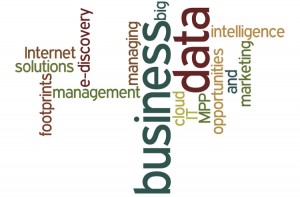
Program Director, Information Technology at American Public University
Volumes of data are building–you added some with your post to Facebook, the information you completed for your dentist, the form you submitted to renew your license plate, and the purchase you made online. You are contributing to big data daily as are other individuals, companies, and organizations.
IBM contends, “Every day we create 2.5 quintillion bytes of data — so much that 90 percent of the data in the world today has been created in the last two years alone.” Gartner Research adds, “Through 2015, 85 percent of the Fortune 500 will be unable to exploit big data for competitive advantage.”
So how do businesses capitalize on big data?
Collecting, using, and archiving big data efficiently is not simple, particularly since there are legal issues associated with storing, accessing, and transmitting data. Managing data correctly involves validated legal protection, encryption, audit controls, and other security measures.
Ignoring big data is not an option either, as the mere volume of data will become too much to store and may present serious implications. These implications include violating privacy policies and regulatory compliance; undermining management’s efficiencies and keen customer service; and limiting marketing opportunities and overall productiveness.
Solutions for Usage
Analyzing data and information collected from a plethora of electronic activities and Internet footprints offers businesses observable patterns that they can use to market products and services and make informed decisions. Companies such as Amazon, Humedica, and EcoFactor have realized the value of big data and are harnessing it to advance customer service and build strong customer relationships; solve healthcare issues; and manage global resources such as energy consumption, food production and fuel restrictions.[1] In fact, some training organizations now offer big data boot camps to help businesses manage data, establish more efficient processes via business intelligence (Cloud Business Intelligence and Mobile Business Intelligence) and data warehousing, and address legal concerns such as archiving and e-discovery.
Other solutions include analytics, massive parallel processing (MPP) database technology, and open source options: Hadoop, MapReduce, and NoSQL databases. Selecting the best big data management tool and solution requires testing and evaluating the tool prior to investing—fortunately, open source solutions such as Hadoop and other associated technologies such as Cassandra, Hive, and Pig afford this opportunity. Businesses will need the right tool to adequately address their specific data management needs.
Databases are building with every keystroke you make, text, email, and talk—generating enormous amounts of unstructured and semi-structured data consisting of audio, video, facts, figures, text, log files, numeric values, images, and more. Managing it well is simply not an option for today’s businesses.
About the Author:
Dr. Watson-Stone is currently the Program Director for the Graduate and Undergraduate Information Technology Programs at American Public University System (APUS), where she serves an aggressively growing department. She has over 13 years of experience in the Information Technology field. Recently, Dr. Watson-Stone presented her research e-Books Fad or Revolution at the Emerging Technologies for Online Learning International Symposium (April 9-11, Las Vegas), she co-published her research, Community College Survey Data: The Impact of Quantity and Quality on Informed Decision-Making, at the Association for Institutional Research Annual Forum, Jun 5, 2012 in New Orleans, Louisiana; and presented her research entitled Watch Gaming and Simulation Replace PowerPoint in the Classroom, January 14, 2012 at the Air Education and Training Command Symposium, San Antonio, Texas. She further co-published several other articles to include “RFID with Real Implications”, “Artificial Intelligence in Information Security”, and the “Evolution of Information Security.”
[1] Fehrenbacher, K. (2011). 5 companies using big data to help the planet. Retrieved from http://gigaom.com/2011/06/19/5-companies-using-big-data-to-help-the-planet/

Comments are closed.